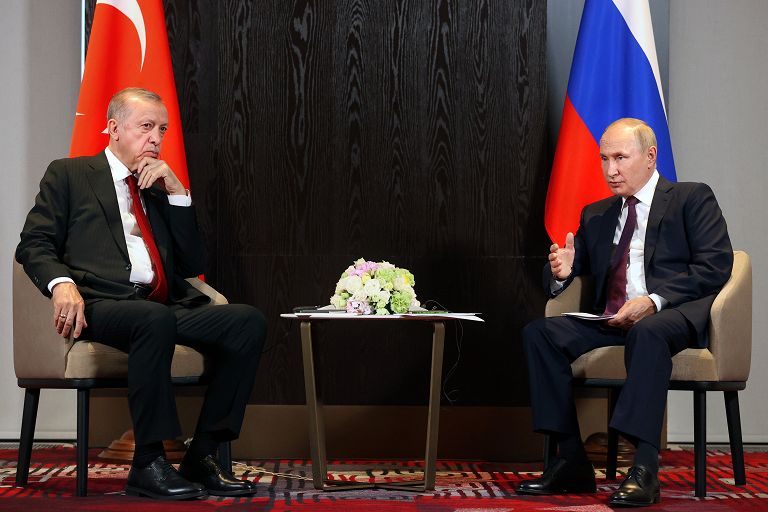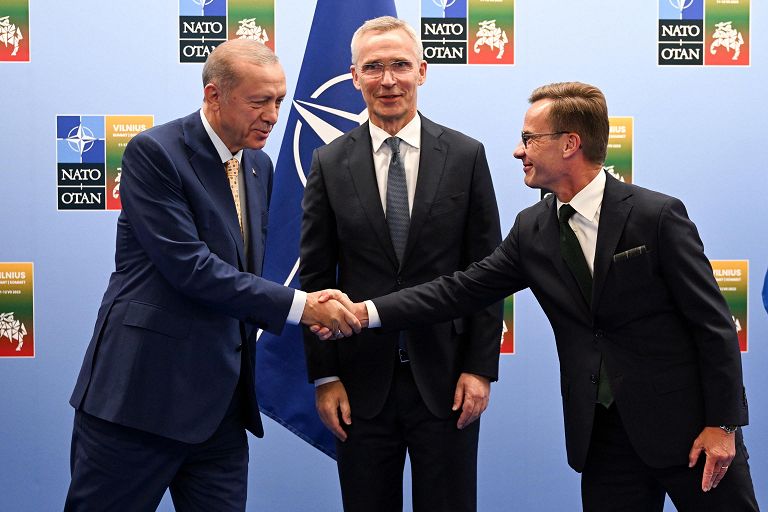With the Kremlin’s official announcement picked up by Tass reporting this the wheat dealto enable the export of Ukrainian grain products, we again questioned the role of the Turkish president Recep Tayyp Erdogan. In fact, he was the big supporter of the agreement, which expires today, signed on July 22, 2022 under the name Black Sea Initiative and signed by representatives of Russia, Turkey, Ukraine and the United Nations. Since March 18 last year, Moscow had decided to extend it by 60 days until May 18; and then, last useful date, until today. Yesterday the last Turkish merchant ship left the port of Odessa with a cargo bound for the southern coast of the Black Sea.
Cargo ship with Ukrainian grain
And now What will Erdogan do? Will he again present himself as the “great mediator” of extensive and laborious negotiations, not only within the framework of the Kiev-Moscow war scenario, but on a broader scale? The president and former mayor of Istanbul, bolstered by his reconfirmation as head of state in the May 28 runoff, has always played his role with keen international activism, particularly in the Middle East. You remember, for example, the spears fired against Israel for its operations in the Gaza Strip (at the Davos Economic Forum in January 2009, there was a famous direct verbal confrontation between the then Turkish Prime Minister and Israeli President Shimon Peres).
Not to mention the tensions, even more recent ones, with Greece (Ankara’s historical enemy) to whom the person directly concerned threatened last year in the tones of an authentic sultan: “Hey Greece, look at the story. If you exceed the limits, you will pay a very high price. Your occupation of the islands is none of our business. When the time is right, we will do what is necessary. And as we say: We can come suddenly, in one night“.
Since coming to power, Recep Tayyip Erdogan has made no secret that he wants Turkey to become a regional power in the wider Middle East and strengthen his influence within the country’s borders through an autocratic turn of democracy (as they say). democracy); and above all to consolidate it outside of his sphere of influence. For that, with the outbreak of war in UkraineAlthough Ankara is part of NATO, it has not been influenced too much in its positioning towards the western front (US, UK and allies), which militarily supports Zelenskyy and is working behind the scenes towards Putin’s defeat on the field.
 AP photo
AP photo Vladimir Putin with Erdogan
The relationship with Putin despite the war in Syria
While I voted with the West on the occasion of important resolutions at the UN (on April 7, 22, when the United Nations expelled Russia from the Human Rights Council; and on October 12, 22, because of the condemnation and rejection of the Russian referendums in the occupied territories of Donbass) Turkey takes at least a position “ “different” and “tender”, which is reflected in some rather “gentle” and “friendly” attitudes towards the Kremlin. After all, it is the presidents themselves Erdogan and Putin can look back on an old friendship and collaboration (and most likely mutual respect) even if they weren’t always in the same ‘trench’. It is the case civil war in Syria, in which Moscow intervened militarily and massively alongside President Bashar el-Assad. Instead, Ankara has positioned itself close to the more moderate or more radical anti-Assad rebels (ISIS is involved), thus hampering the Assad rebels’ action Syrian Kurds as allies of Kurds from Türkiye. Consequences and reflections on the age-old problem of the PKK (Kurdistan Workers’ Party), which is accused of terrorism by the Turkish government.
 handle
handle The NATO Secretary General at the end of the trilateral meeting with the heads of state and government of Sweden and Turkey in Vilnius
The veto against Sweden in NATO (unlocked).
This brings us to the recent negotiations that led to the resolution of the “Swedish question” within NATO, ie the veto placed by Erdogan Stockholm’s entry into the Atlantic Alliance (following the accession of Finland on April 4, whose dossier had been split from the Swedish precisely because of opposition from the Turkish President). L’dead end has resolved lately Vilnius peakin Lithuania, where Secretary General Stoltenberg announced that Sweden would become the 32nd member of NATO. “As soon as possible”, but “not before October”, Erdogan immediately specified. Analysts have pondered what lies behind that painful yes – delayed by the fact that, according to the “Sultan of Ankara,” Stockholm would have offered shelter and assistance to the PKK’s Kurdish exiles. And they have put forward some hypotheses: as Erdogan himself publicly stated, there would have been parallel and converging demands in exchange for a yes to Sweden to bring Turkey into the European Union. A scenario that, however, due to the non-compliance with economic standards and respect for human rights on the part of the Bosphorus, is immediately ruled out and in any case currently impossible.
What is really behind Erdogan’s about-face? It is half-heartedly clarified that the Turkish President received in return important concessions, not only from Sweden (new anti-terror law, more agile fight against terrorist groups, lifting of the arms export ban to Turkey), but also from the European Union (Re-negotiations on visa liberalization and customs union) e from the United States (Sales of F16 in Ankara, blocked for years). In short: At the moment it is still early to clear up the “Sweden affair”. But it is certain that even in this case, Recep Tayyip Erdogan fully demonstrated his skills as a great mediator.